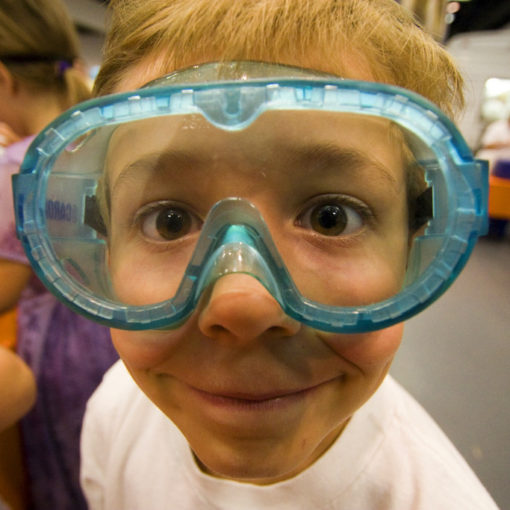Nothing makes my blood boil quite like lying. Not the white lies that we all tell from time to time. It’s the lies that come disguised as truth in the form of misinformation. Lately, Congress and the general public have discussed several chemistry-related issues, anywhere from climate change to exposure limits for certain chemicals found in vaccines, foodstuffs, children’s toys, and everyday products.
Don’t get me wrong. It’s great that the general public is finally discussing these topics. But when it comes to formulating an educated opinion on such matters, it appears that the public is dismissing scientific expertise in favor of fabricated, yet attractive, pseudoscience arguments raised by a select few.
I could provide a million or more examples of this, but I shall limit myself to a pair of misguided people. First, the New York Times best seller and ubiquitous blogger the Food Babe reports to the masses on the hazards of chemical additives in processed foods and beer. Only problem is that she has left sound science out of a science discussion. She claims that the antifreeze chemical propylene glycol is present in beer when it’s really propylene glycol alginate from kelp. Her website even asks us to “end the confusion” as if each one of us has been misinformed until she entered the discussion. Several scientists have taken her to town on her poorly written, misleading blogs here, here, and here.
Yale neurologist as well as medicine and science blogger Dr. Steven Novella sums it up perfectly: “Spouting uninformed opinions is one thing, but presenting information in an authoritative manner as if from an expert should not be attempted by the non-expert…The Food Babe is shockingly scientifically illiterate and should not be giving advice to anyone. She is not an expert. She does not seem to have any respect for expert opinion or carefully sourced information. Her advice is a crap shoot of common knowledge, fearmongering, gross scientific illiteracy, misinformation, and ideological nonsense.”
Second, actress Jenny McCarthy has ruffled a few feathers by suggesting that vaccines and autism are linked. In April 2015, a team of doctors, researchers, and autism specialists from the Lewin Group, Optum, and the A.J. Drexel Autism Institute published their JAMA study of nearly 96,000 children, concluding that vaccines cannot be linked to autism. This is just one of many studies stating the same thing. Even though reporters and science writers are condemning Jenny McCarthy and other anti-vaccine celebrities, measles cases are still rising according to the CDC.
In our age of information overload, how can this misinformation continue to flourish and strongly influence the masses? Science bloggers like Drs. Steven Novella and David Gorski have likened my two targets, the Food Babe and Jenny McCarthy, to each other. What these people share in common is all too predictable – a knack for making money from our fears. Misinformation and the fear it instills survive because they pick at our gaps in understanding the subject matter. Not everyone has a science background. But at some point, every one of us will face a challenging science issue and make a decision for ourselves and our loved ones.
In our search for the truth, we hit the internet or take advice from others we trust. Essentially, we seek a translation. We cannot live in a world without chemists entering the conversation on topics such as chemical toxicity, vaccines, and climate change among others. Chemists are absolutely crucial to the conversation, and we are the ones ideally suited to translate science into words laypeople can understand. Why then are we allowing ourselves to be pushed out of public problems in science for which we theoretically have the best advice?
Modern era of scientific trust – or distrust
In 1957, the National Association of Science Writers and the Rockefeller Foundation sponsored a study to determine how Americans reacted to science being presented in mass media just before the Sputnik launch ushered in the Space Age (Davis, Public Impact of Science in the Mass Media, 1958). The Survey Research Center at the University of Michigan conducted the 1,900 interviews with random selection to generate a national probability sample. This study, the only one of its kind at the time, shows that nearly 90% of Americans believed that “science and technology had won the war” (WWII). Furthermore, Americans agreed that their quality of life was improved through significant advancements in medicine (Davis, Public Impact of Science in the Mass Media, 1958).
However, only 1 in 6 could correctly answer questions regarding current events in science. The public supported science but didn’t clearly understand it. Additionally, they supported science with only some apprehension, namely that science “makes our way of life change too fast.” (Oh science. Someone hand them an iPhone!)
In the 1970s, the National Science Board conducted frequent data collection regarding the support of science in 1972, 1974, and 1976. The results are summarized here. Still a majority of people believe that our lives are better because of science (70%). Comparable studies conducted in the late 1970s and early 1980s show a similar support at 80%.
Along with this high approval rating, there is public concern growing over science. Life moving too fast, as mentioned earlier, doesn’t seem that bad. However in the 1983 study, a large minority (over one-third) believed that the growth of science could lead to a select number of people controlling their lives. Chemical warfare, though lauded for winning the war, suddenly drew caution. According to the same study, 75% of participants believed that “with the development of nuclear, chemical, and biological weapons, science and technology may end up destroying the human race.”
From these results, we can conclude that Americans understand that there is both risk and reward associated with advancements in science. Though the majority of the public trusts and believes in science, they are leery of the misuse and abuse of it. Overall, the benefits outweigh the risks according to those interviewed, even in studies into the late 1990s.
Fast forward to 2015. The Pew Research Center recently published a report highlighting that a large majority of the general public (79%) still agrees that science has a positive impact on their lives. However, the general public and scientists differ greatly on their opinion of scientific theories such as human evolution (65% vs. 98%, respectively) and anthropogenic climate change (50% vs. 87%).
These differences also hit hard when it hits home – at the dinner table. When asked if it is safe to eat foods grown with pesticides or to eat GMO foods, Americans and AAAS scientists responded 28% vs. 68% and 37% vs. 88%, respectively.
What this says to me is that the general public approves of science yet doesn’t believe in it. Perhaps, these people are cautious to offer a confident approval without feeling well informed. Additionally, they may believe that an issue like human evolution is directly at odds with personal core values, such as religious beliefs.
I can’t blame them. Nobody gives a blank check of approval. After years of studying scientific theories, I am 100% certain that every aspect of science will never be 100% certain. People who don’t study science don’t get this. One unfortunate way around sifting through evidence is seeking an interpretation of science that supports an original bias, something called motivated reasoning. Ill-advised people such as the Food Babe and Jenny McCarthy leverage this to try to get people to believe what they want them to believe. They can conjure up supposed “holes,” or even create a non-scientific, magical issue and label it as plausible, in a scientific argument to generate fear. Motivated reasoning is a fact of life. People will always seek to protect their closely held beliefs. We have to accept that and find a way to work around it if we are ever going to break through.
The only way to combat this is the infuse science and scientists into the issues at a very early stage. We need scientists and proven, credible experts to be engaged early on in the process and dispel debates created simply for filibustering, fearmongering, and profiteering. We can’t just sit back and wait for something to become controversial. We have to be there as a trusted voice at the beginning for our voices to have any impact later on.
Turning the page on science “illiteracy”
There are several steps to tackling the growing issue of misinformation in mass media. As scientists, we must quickly report the misuse of science. Write blogs, appear on radio and TV shows, do whatever it takes to clean up the non-scientific mess. You don’t have to be Neil DeGrasse Tyson, but you can be a credible voice in whatever circles you operate. After all, survey after survey tells us that we have the public’s trust – why not build on this trust and aim at ironing out the communication kinks?
We must show the general public how to evaluate whether Hollywood celebrities or rising internet stars or local reporters are telling the truth. An evidence-based approach starts with publicly available data such as material safety data sheets (MSDS), which include exposure limits and other health concerns for chemicals. Emphasis should be placed on key factors such as dosage and short-term vs. long-term exposure to certain chemicals.
Perhaps, our most important step is this we must always encourage people, especially children from a young age, to be interested in the natural world around them. Interest drives inquisition, which drives discovery and feeds back to interest. Challenge your kids to go outside and play for an hour. Ask them to find 20 things outside that they did not already know. A blade of grass has a veins or lines down it. Raindrops in a puddle form concentric circles. Plants have roots below the soil. Let your kids get dirty, and please – blame it on a scientist.
Photo credit: NASA / CC BY-NC 2.0





One thought on “Science vs. Everybody”
Thanks very much for publishing this well written and thoughtful article.